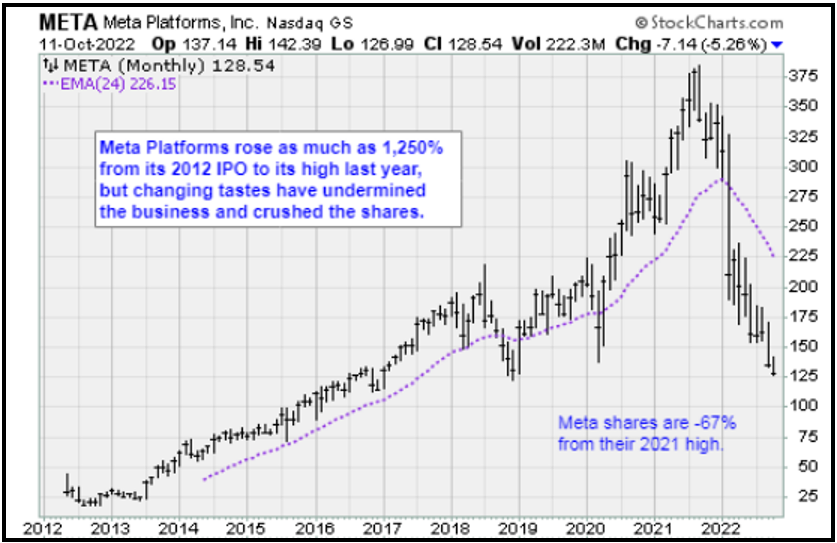Virtual reality is finally ready for the masses. Unfortunately, the masses are still not ready for VR following years of bad PR.
On Tuesday, Meta Platforms (META) unveiled Quest Pro, its $1,499 VR headset with eye and face tracking, and color passthrough video for mixed reality. It’s tech Meta badly needs to grow its business.
Yet investors should continue to avoid Meta shares.
In many ways, Meta is a lesson on the dangers of fetishizing investments. As Facebook, the company based in Menlo Park, California, became an icon. During the course of two decades, the business grew from an idea in a Harvard dorm room to a global behemoth with nearly 3 billion monthly users.
Mark Zuckerberg, founder and chief executive officer, took a scrappy startup and became the home page for 60% of the world’s population with an internet connection.
Facebook seemed unstoppable. Although members didn’t like its clunky user interface and bewildering privacy choices, they were compelled to maintain their accounts. Facebook was where friends and family congregated online.
Related Post: Digital Ads Are the Future of Online Streaming Services
Unfortunately, the company was built atop shifting sands controlled by competitors. That flaw was exposed in 2020 when Apple (AAPL) changed the way its mobile operating system worked, curtailing advertisement tracking. It was a devastating blow to Meta’s digital advertising business.
That change alone led to $12 billion in lost revenue at Meta, according to a report from Forbes.
Meanwhile, poor privacy choices made long ago have come back to haunt Zuckerberg. In the early years, Facebook was heavily dependent on third-party developers to drive growth.
User and demographic data were routinely made available. The flaw in this business model became apparent in 2018 when Cambridge Analytica used this data to drive disinformation campaigns during the 2016 presidential election run-up.
VR is Zuckerberg’s plan to own the foundation and build business models with Meta at the core.
This new strategy popped up Tuesday all over the Quest Pro reveal. Several big corporations appeared to be latching onto Meta’s VR coattails. Among other deals, the company announced partnerships with Microsoft (MSFT) for its Teams, Office and Windows 365 software suites.
Based in Redmond, Washington, the company’s official blog notes that Xbox Cloud Gaming will also be ported to Meta’s Quest headsets. YouTube is moving its massive VR video platform to Quest. And NBCUniversal Media will bring its Peacock streaming application and other content to Quest headsets, according to a report at Variety.
Related Post: Apple on Track to Lead Augmented Reality
Zuckerberg claims that the Quest Store, Meta’s VR app store, has generated $1.5 billion in sales to date, and 33 of the 400 VR titles there have grossed more than $10 million thus far.
However, even with these impressive stats, the VR business at Meta is a loser. Reality Labs, its VR subsidiary, lost $2.8 billion in Q2 of 2022, up from $2.4 billion a year ago. Revenues jumped to $452 million, up 48% from a year ago.

Click here to see full-sized image.
And that’s the rub. Meta’s VR business simply is not big enough to offset its lost revenue from the Apple OS changes. Plenty of people believe VR will never be foundational at Meta.
Persuading people to buy expensive computers to be worn on their faces is a tougher sell than building a smartphone application for a device most people feel they can’t live without.
In this context, Facebook is a just an amazing one-hit wonder that touches 3 billion people. Unfortunately, that business is now contracting as gazillions of bored smartphone users spend time on TikTok and other social media rivals instead. Meta is also under constant legislative attack stemming from its past privacy indiscretions.
Investors tend to fetishize companies like Meta, thinking they need to be on Team Meta. But unless you are an employee, there is no Team Meta — only Team You. And you only get something out of Meta shares when they are going from the lower left to the upper right of a chart.
If the shares aren’t capable of making you more money, they should be discarded and avoided.
Fetishizing a company is easy to do when you consider Zuckerberg made himself and early shareholders fabulously rich through a series of brilliant maneuvers during the growth phase of Facebook.
From the company’s initial public offering in 2012 through August 2021, shares surged 847% to a lofty $373. Zuckerberg’s net worth catapulted to $142 billion.
However, since then it has all been downhill. Shares fell on Tuesday to only $128.54.
It’s too early to completely write off VR at Meta, yet it is irrational and excessive to bet Zuckerberg can fix declining near-term growth with a $1,500 computer to be worn on one’s face.
Investors should abandon their Meta fetish and avoid Meta shares. As always, be sure to conduct your own due diligence beforehand.
Best wishes,
Jon D. Markman
P.S. If you enjoyed this issue, check out my paid service, The Power Elite, where members are sitting on open gains around 113%, 111% and 126%!

